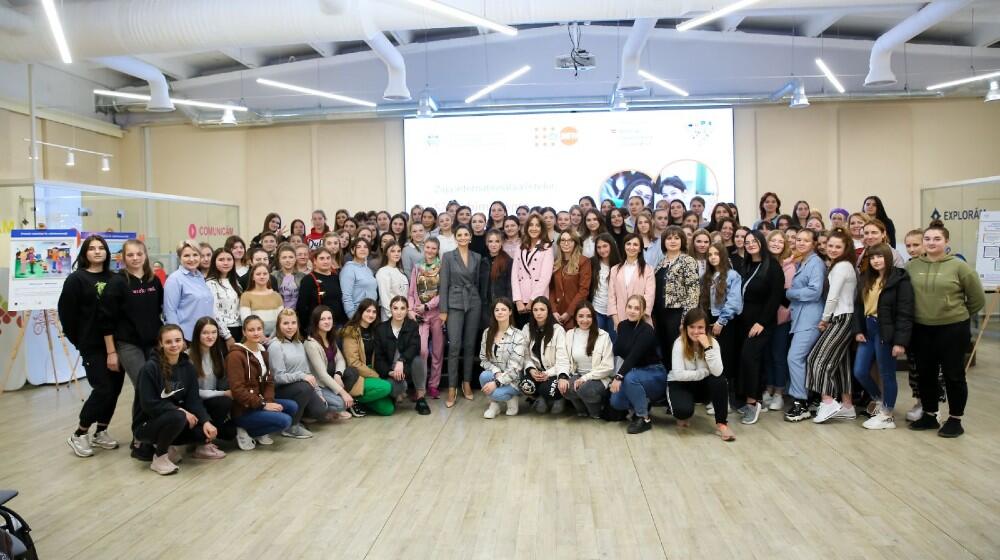On the International Day of the Girl Child, more than 100 students from VET education, representatives of central public authorities, teachers, healthcare and psychology professionals met for a public discussion focusing on menstrual health and hygiene, myths and stereotypes, and usefulness of modern technologies for menstrual cycle monitoring. The discussion highlighted the many initiatives prioritising reproductive health, including menstrual health in the Republic of Moldova. However, additional efforts are needed to offer menstrual hygiene products to girls in schools and to bring this issue on the public agenda.
‘Yes, we women have menstruation and this is natural. Schools must be ready to speak openly about this and to support female students’, said Marina Morozova, member of the Moldovan Parliament, at the opening of the event. She delivered a supportive message for girls, underscoring that they have the full support of the 40 women MPs in the Parliament, who want the rights and dignity of girls and women to be a priority.
‘I am glad that we also have the support of development partners, such as the UN Population Fund - UNFPA. We will continue our work with them to ensure adolescent-friendly policies, in particular in schools and universities, where we need a separate budget for hygiene products,’ the MP added.
Valentina Plămădeală, Senior Consultant, Vocational Education and Training Directorate, Ministry of Education and Research, confirmed their commitment to make all educational institutions youth-friendly. ‘The vocational education and training schools are equipped with sanitary facilities and the necessary infrastructure to ensure hygienic conditions for both girls and boys. The same goes for the dormitories, where the majority of students are living. Youth-friendly classrooms have been also opened in 12 VET schools with the support of UNFPA and Austria.’
Ludmila SÎRBU, youth programs analyst, United Nations Population Fund in Moldova: We want Moldovan girls to transition safely from a child to an adult, to become women, mothers. We engage actively so that young people in the Republic of Moldova can develop their potential harmoniously, with the necessary life skills, without gender discrimination, violence and bullying. Menstruation is often a cause for bullying in schools and we, the adults, need to make sure we end it.
UNFPA Moldova aims to support girls in VET schools with the help of technology. For four months, 150 girls participated in an innovative global project to test the IMMI menstrual watch that monitors the menstrual cycle without requiring any app or internet connection.
Sarah COTTEE, designer of IMMI watches, United Kingdom: The idea of IMMI watches came to me after meeting several women who know nothing about their menstrual cycle and their life changed radically because of this: instead of going to school or to their job, they had to stay at home and take care of their children. I hence started doing research, step by step, involving my mother, grandmother and sister. I understand how important it is for every girl and woman to know their body. It is a natural thing, like knowing the time of the day.
Nina CHIRIAC, peer educator in life skills development, student at the Centre of Excellence in Light Industry, Chișinău: I used an app before, but forgot to enter the dates, but with this watch you can easily see every day of your menstrual cycle. It's important to know our bodies from adolescence and to talk openly about topics that were once taboo, including the menstrual cycle.
The partnership between UNFPA and IMMI is part of UNFPA's efforts to work with governments and communities around the world to promote menstrual hygiene and uninterrupted access to health education and menstrual hygiene services, both in and out of school. The IMMI watch aims to empower women and adolescent girls, especially those in rural areas and without stable internet access, with information and knowledge about their menstrual cycle.
The event dedicated to the International Day of the Girl Child was organised under ‘Develop life skills and healthy behaviors of students in Vocational Education (VET) & training for their development and job readiness’ Project It supports the development of young people's life skills by adopting a healthy lifestyle, free from gender stereotypes and gender-based violence and with equal opportunities for girls and boys, and people with disabilities that will prepare them better for adult life and successful integration on the labour market.
The Project covers 12 VET institutions from Chișinău, Cahul, Nisporeni, Rezina, Orhei, Edineț, Râșcani, Bălți. The project is implemented by the United Nations Population Fund (UNFPA), with the financial support of Austrian Development Agency (ADA) from the funds from the Austrian Development Cooperation, in partnership with the Ministry of Education and Research.


